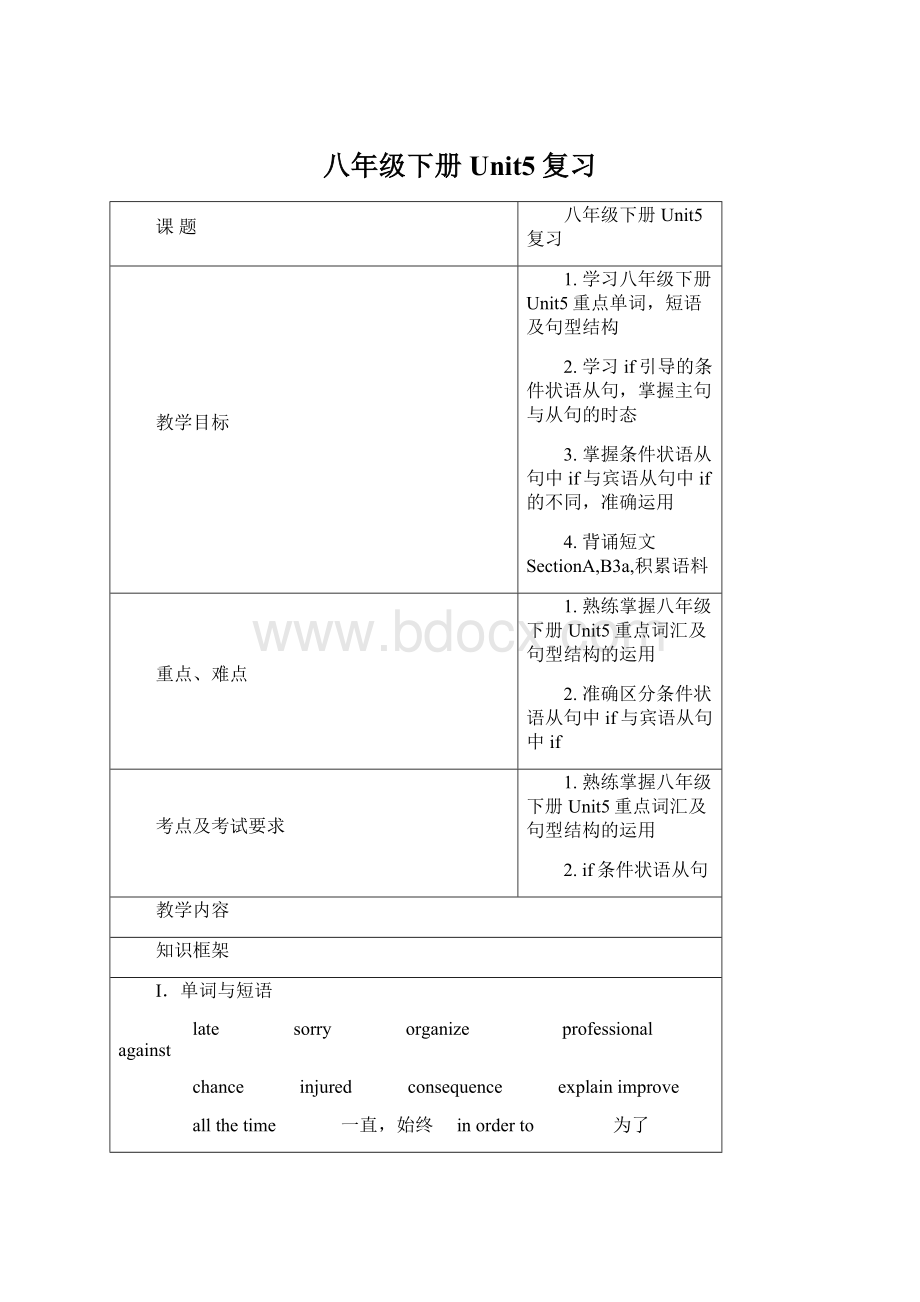八年级下册Unit5复习Word文档格式.docx
《八年级下册Unit5复习Word文档格式.docx》由会员分享,可在线阅读,更多相关《八年级下册Unit5复习Word文档格式.docx(18页珍藏版)》请在冰豆网上搜索。

单词:
组织(动)有组织的(形)花健康的
反对慈善团体机会运动员
真诚地律师今晚厨师
烹调伤害(动)受伤的
职业的业余的
短语:
让你进入穿牛仔服
乘公共汽车去…玩集会游戏
一半的学生学校集会的规则
带走它、它们要求某人(不)去做
带…去…带…来…
去上大学环游世界
赚许多钱受教育
好像,似乎
(2)全世界的人
一直做…谋生
(2)
受伤
知识概括、方法总结与易错点分析
重点难点分析
1.toomuch和muchtoo
toomuch后接不可数名词,用来表示数量太多,意思是“……太多了(数量多)”;
muchtoo后接形容词,用来说明程度的,意思是“太……(程度深)”如:
muchtooheavy太重了(表程度)
错误:
Hehasdrunkmuchtoowater.
正确:
Hehasdrunktoomuchwater.他喝了太多的水。
(修饰不可数名词,表数量)
2.befamousfor和befamousas
befamousfor表示“因……而出名”,for后接表示出名的原因;
befamousas则表示“以……身份而著名”,as后接职业、身份或地位,表示作为……职业、身份或地位是著名的,如:
Franceisfamousforitsfinefoodandwine.法国以其佳肴和美酒著名。
Franceisfamousasaromanticcountry.法国作为一个浪漫的国家而出名。
3.Iwantyoutoremembertherulesforschoolparties.
我想让你记住参加学校聚会的规则。
wantsb.
todosth.想让某人做某事
4.travelaroundtheworld周游世界
e.g.HerdreamistotravelaroundChina.
她的梦想是周游全中国。
5.Ifwehaveittoday,halftheclasswon’tcome.
如果我们今天开聚会,全班有一半的同学将不来参加。
won’t是willnot的缩写
if从句用一般现在时,表示假设,主语用一般将来时。
6.reasonsforbecomingaprofessionalathlete
赞同成为一名职业运动员的理由
for
prep.(表示赞成、支持),其反义词为against
eg.Areyouforhisplanoragainstit?
你是赞成还是反对他的计划?
Whichteamdidyouvotefor?
你投票给哪一个队(组)?
7.reasonsagainstbecomingaprofessionalathlete
反对成为一名职业运动员的理由。
against
prep.反对,与…对抗
注意:
介词后面用名词或动词ing的形式
eg.Areyouagainstmyplan?
你反对我的计划吗?
OurplayedagainstNo.1MiddleSchoolatbasketballyesterday.我校和一中昨天比赛篮球。
8.beginthestory
withthewords.以这些话开头讲这个故事。
begin…with…“以…开始(开头)”
eg.Thewordbeginswith“s”.这个词以“s”开头。
DoesheknowthatayearbeginswithJanuary?
9.consequence后果、结果
eg.Weshouldconsidertheconsequencesbeforedoing.
10.haveagreattime玩得高兴
11.takeaway运走,取走
eg.Don'
ttakeitaway.I'
lluseit.
不要将它拿走,我要用。
12.makealiving 谋生
eg.Hemakeslivingasadriver.
他以开车谋生。
13.makemoney
挣钱
eg.Afterhebecamefamous,hemadelotsofmoney.
14.letin允许……进入,嵌入
eg.Don’tletthebeggarin.
不要让那个乞丐进来。
Ⅴ.课文详解
1.Formanyyoungpeople,becomingaprofessionalathletemightseemlikeadreamjob.
对许多年青人来说,成为一名职业运动员可能似乎是一份理想的职业。
might(表示可能性,推测)
mightdo或许,说不定(一般表示比may较低的可能性)
eg.Shemightwintheprize.她或许会获得那个奖。
Thechildmightbehomealready.那孩子说不定已回家了。
seemlike+名词好像…,似乎…
e.g.Itseemslikeyearssincewelastmet.我们似乎好几年不见了。
2.You'
llbeabletomakealivingdoingsomethingyoulove.
你能做你喜欢的事来谋生。
beableto+动词原形,“有能力做某事”
e.g.SheisabletolearnEnglishwell.她能学好英语。
Doingsomethingyoulove.做你喜爱的事。
youlove定语,修饰前面的something。
3.Peopleallovertheworldwillknowyou.全世界的人将会认识你。
allovertheworld作定语,修饰它前面的名词people。
4.Thisisagreatchancethatmanypeopledonothave.
这是一个许多人所不能得到的难得的机会。
thatmanypeopledonothave是一个定语从句,修饰它前面的chance。
great(表示程度,放在名词之前)非常的,异乎寻常的
eg.agreattalk健谈的人
Sheisagreatfriendofmine.她是我非常要好的朋友。
5.Watchyouallthetimeandfollowyoueverywhere.一直看着你,你走到哪都跟着你。
allthetime一直
eg.Look!
Themonkeysarerunningandjumpingallthetime.看,猴子们一直在跑在跳。
everywhere
副词(adv.)到处
I'
velookedeverywhereforit.为了找它,我到处找了个遍。
Thedogfollowedhimeverywhere.无论在哪,那狗都跟着他。
6.getinjured=beinjured受伤
injured(adj)
eg.Hewasbadlyinjuredintheaccident.他在那次事故中受了重伤。
7.You'
llhaveadifficulttimeknowingwhoyourrealfriendsare.
你将很难知道谁是你真正的朋友。
whoyourrealfriendsare是一个宾语从句,它作knowing一词的宾语,这是一种“特殊疑问词+陈述语序的”宾语从句。
e.g.Idon’tknowwhereheisfrom.我不知道他来自哪里。
特殊疑问词+陈述语序
Canyoutellmehowoldheis?
你能告诉我他多大吗?
howoldheis是宾语从句。
8.Ican’trememberhowtogettoyourhouse.我记不起来怎样去你家了。
howtogettoyourhouse是不定式作remember一词的宾语(此处不定式是指一个特殊疑问词+to+动词原形)
这个不定式短语可以用宾语从句来替换如下:
Ican’trememberhowIcangettoyourhouse.
E.g.CanyoutellmehowtogettoLuxunPark?
Weknowwhowewillask.
9.getenoughexercise得到充分的锻炼exercise名词,“锻炼”
10.gobackhome回到家,此句可以换成returnhome
11.laughatyou嘲笑你
laughatsib.嘲笑某人
E.g.Don’tlaughatapersonwhoisintrouble.
我们不要嘲笑陷于困境的人。
12.Howmanyaliensdyetheirhairbrown?
多少外星人把他们的头发染成棕色?
dye
v.把…着色,染色
Shedyedherwhiteskirtgreen.她把白色裙子染成绿色的。
词语辨析
1.getto与arrive
getto与arrive均为“到达”之意。
①getto后面接名词,e.g.gettoShanghai/NewYork
但“到达这里/那里”则为gethere/getthere。
因为here和there为副词,所以它们前面不加to。
②arrive是不及物动词,它后面不能直接跟名词,必须与介词in/或at连用之后+名词。
e.g.TheyarrivedatJim’shouseat2p.m.
(小地点之前用介词at)
WhendidtheyarriveinBeijing?
(大地点之前用介词in)
Ididn’tknowwhenhearrived.
我不知道他何时到达的。
此处arrived后面不需要宾语,故也不要加in或at。
“到达这里/那里”则改为arrivehere/there
“到家”则为”arrivehome”,因为here,there,home均为副词,所以不加in/at。
2.join和takepartin
join与takepartin均为“参加”之意,是动词
①但join后面跟一个组织,政党,社团,团体等,“参加并成为其中一名成员”
eg.jointheParty
入党jointheLeague入团
Shewantstojointhesingingclub.
另外,joinsb.
是“参加到某人的行列”之意
eg.Won’tyoujoinusinatennismatch?
你不想参加我们网球比赛吗?
Hejoinedusfordinner.
他与我们共进晚餐。
②takepartin(动词短语)指参加(某种活动)
eg.Areyougoingtotakepartinthediscussion?
你要参加讨论吗?
Hetookpartinthespeechcompetition?
他参加了演讲比赛。
DidtheytakepartinthatmeetinglastMonday?
他们上周一参加那次会了吗?
“花费”知多少?
——take,spend,cost&
pay:
take、spend、pay、cost的用法:
spend的宾语通常是金钱或时间,句型:
sb.+(spend)+时间/金钱+onsth/(in)doingsth.;
take的主语通常是事情,句型:
sth./It+(take)+sb.+时间+todo…。
(如果是动作则常用it作形式主语将动词不定式后移);
cost的宾语通常是时间、金钱、力气,句型:
sth.+(cost)+sb.+时间/金钱/力气.;
pay的宾语通常是金钱,句型:
sb.+(pay)+金钱+for+事物.
如:
Shespentthewholenightreadingthenovel.(她花了一个晚上看那本小说)/Thisjobwilltakemetwodays.=Itwilltakemetwodaystodothejob.(做这件事情要花我两天的时间)/Howmuchdoesahouselikethiscost?
(像这样的房子要花多少钱?
)/Ipaidhimtwentydollarsforthebook..(我花了20元从他那儿买了书)
跟踪练习
1完成这项工作用了我3个小时。
____________________________________
2他用了30分钟写那封信。
3这台电视机花了他5000元.____________________________________
4做这项工作花了工人们很长的时间。
针对性练习
用所给词的适当形式填空。
1.Willyouhelpme____(make)thefood?
2.Whenisagoodtime____(have)theparty?
3.Ifhe____(walk)toschool,he’llbelate.
4.Ifhe____(have)enoughtimetomorrow,he____(meet)youinhisoffice.
5.It’scold.We’dbetterkeepthedoor____(close)
6.Youcanseemanybeautifulf___________inthegraden.
7.Whatwillh__________ifIdon’thaveanIDcard?
8.Willyouhelpmeo_________theparty,Jim?
.
9.It’saformalparty,pleasedon’twearj____.
10.Idon’twantthepen,pleasetakeita______.
11.Tom___________(organize)thepartylastnight.
12.Iwanttodosomework________(help)thepoorchildrenwhocan’tgotoschool.
13.LuXunwasa__________(fame)writerinChina.
14.Whydoyou______(laugh)atthepoorman?
15.Hemakesa________(live)asataxidriver.
单项选择
()1.—Didthey___________agreattimeyesterday?
—Yes.Theyenjoyed____.
A.have,themB.had,theyC.have,themselves
()2.You’dbetterlookupthenewwordinadictionary____youdon’tknowit.
A.ifB.whetherC.though
()3.Theyounggirlwantsto____jeanstotheparty.
A.putonB.dressC.wear
()4.Halftheclass____now.
A.singsB.issingingC.aresinging
()5.Thechildrenwillgotoparkifit____tomorrow.
A.isn’tsnowingB.won’tsnowC.doesn’tsnow
()1.Thevolleyballmatchwillbeputoffifit________.
A.willrain B.rains C.rained D.israined
()2.There________afootballgameonTVthisafternoon.
A.isgoingtohaveB.willbeC.isgoingtoplay D.willplay
()3.Thisworkis________formethanforyou.
A.difficultB.themostdifficult C.mostdifficult D.moredifficult
()4.I'
llcatchupwithLucybeforeshe________thefinishingline.
A.reach B.isreaching C.reachesin D.willreach
()1.Willyougivehimachance(机会)____theimportantmeetingtomorrow.
A.totakepartinB.takepartinC.tojoin
()2.Whynot____yourteacherforhelpwhenyoucan’tfinish____itbyyourself?
A.ask,writeB.toask,writingC.ask,writing
()3.InBritain,youmustbe18____youwanttodriveacar.
A.becauseB.soC.if
()4.—Let’sgooutforapicnic(野餐)onSunday.—______.
A.NicetomeetyouB.GoodideaC.Thesametoyou
()5.Thegoodnewsmadeusvery____.
A.happyB.tobehappyC.happily
汉译英
1.IfIhavetime,Iwill__________________________________(周游世界).
2.Mydreamisto_____________________(上大学).
3.中国因为长城而闻名。
Chinais_________________theGreatWall.
4.我们应帮助那个穷孩子接受教育。
Weshouldhelpthepoorchild_______________________.
5.为了赚许多钱他努力地工作。
Heworkshardto_____________________.
考点二:
语法小结
1.if条件句
2.现在进行时表示将来的时间
一.if条件句
1.if条件句:
条件句用于陈述语气,表示假设的情况可能发生,其中if是“如果”的意思。
构成
条件从句
主句
时态
If+一般现在时
主语+shall/will+动词原形
例句
Ifhecomes,
hewilltakeustothezoo.
2.用法:
(1)条件状语从句通常由连词if引导,意为“如果、假如”,主句不能用begoingto表示将来,而应该用shall,will。
Ifyouleavenow,youarenevergoingtoregretit.(错误)
Ifyouleavenow,youwillneverregretit.(正确)
(2)if“如果”,引导条件状语从句,if从句则用一般现在时,主句用一般将来时。
Ifitrainstomorrow,Ishan’